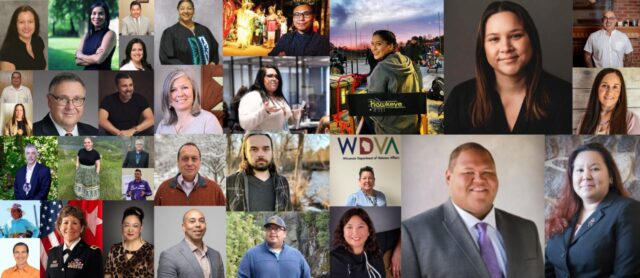Just months after we published our first news stories in August 2015, we tried something new: we listed and published brief biographies of the state’s 28 Most Influential Black Leaders. People really liked it, shared it on social media, told us who else should have been on that list. Many asked me if we’d do another list the next year; I said yes, we probably would.
We did more than that. That next year, we published another list of the state’s most influential Black leaders, as well as a list of the state’s most influential Latino leaders. Almost immediately, we started hearing an important and very reasonable question: what about the state’s Asian American and Indigenous leaders?
We wanted to do those lists, but we wanted to do them right. It took us some time to build the authentic relationships within those communities, and to gain their trust. I’m glad and proud that we took that time and did that work; it resulted in us publishing those lists for the first time in 2020.
This week we are proud to present the fifth annual edition of Wisconsin’s Most Influential Native American leaders.
Every year, with every list, I’ve intended these lists to highlight the beauty of the diversity across our state. I want kids here in Wisconsin to see role models of people who are succeeding, to know that it’s possible for people of color to achieve great things here.
This week we shine a statewide spotlight on the dedicated leaders of Wisconsin’s Indigenous communities. The people we highlight this week are elected leaders, business leaders and community leaders, doing difficult, important work, often in the face of discrimination and literally generations of oppression.
We are also aware that this list, like every other, is not comprehensive. It’s obvious just from the number of nominations that there are far more than 33 influential Indigenous leaders doing good work in Wisconsin. We hope you will let us know about people in your community who we can include on future lists. For now, though, we just want to introduce you to a few of the people doing the work, often behind the scenes and without the accolades, across Wisconsin.
You might know a few of these names, but there’s a good chance that most of them will be new to you. I urge you to get to know them. Reach out to those living and working in your communities. Learn from them, network, create partnerships. And spread the word — let others in your network know that we have people of all ethnicities living and working across Wisconsin to make sure everyone here can thrive.
Henry Sanders
CEO, 365 Media Foundation
Publisher, Madison365
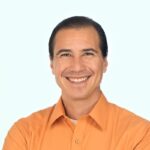 Ashley Hesse is VP of Policy for Indigenous Pact, an organization that works for health equity for Indigenous people. A Comanche descendant, he joined Indigenous Pact in 2018 with years of experience in health equity, which included managing the “Money Follows the Person” Tribal Initiative at the Wisconsin Department of Health Services and directing programs for Arc-Winnebago County Disability Association. He also serves on the board of Casa Esther and previously chaired the City of Oshkosh’s Diversity, Equity and Inclusion Advisory Committee.
Ashley Hesse is VP of Policy for Indigenous Pact, an organization that works for health equity for Indigenous people. A Comanche descendant, he joined Indigenous Pact in 2018 with years of experience in health equity, which included managing the “Money Follows the Person” Tribal Initiative at the Wisconsin Department of Health Services and directing programs for Arc-Winnebago County Disability Association. He also serves on the board of Casa Esther and previously chaired the City of Oshkosh’s Diversity, Equity and Inclusion Advisory Committee.
 Denise Wiyaka is director of the UW Madison American Indian and Indigenous Studies program, where she spearheads the Annual Evening of Storytelling and established the Elder-in-Residence program as associate director in 2018. She was recruited to American Indian Studies in 2001 by Ada Deer, became associate director in 2003 and assumed the role of Director in 2021. Denise has expanded Indigenous Language offerings through collaborative initiatives with Tribes, with the goal of ultimately offering courses in all languages of the Tribes in Wisconsin. She is a member of the Yankton Sioux Tribe and grew up on the reservation in South Dakota. She holds a law degree from the University of Oregon and an LLM from Georgetown University.
Denise Wiyaka is director of the UW Madison American Indian and Indigenous Studies program, where she spearheads the Annual Evening of Storytelling and established the Elder-in-Residence program as associate director in 2018. She was recruited to American Indian Studies in 2001 by Ada Deer, became associate director in 2003 and assumed the role of Director in 2021. Denise has expanded Indigenous Language offerings through collaborative initiatives with Tribes, with the goal of ultimately offering courses in all languages of the Tribes in Wisconsin. She is a member of the Yankton Sioux Tribe and grew up on the reservation in South Dakota. She holds a law degree from the University of Oregon and an LLM from Georgetown University.
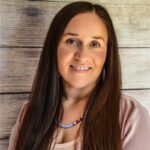 Dr. Rosa Yekuhsiyo King is founder of Tehatiw^nakhwa Language Nest, an immersion program that teaches the Oneida language to students aged 3 to 8. She is also an adjunct instructor at St. Norbert College in DePere and College of Menominee Nation, teaching Indigenous culture, history and language. She has a bachelor’s degree in American Indian Studies from the University of Minnesota Twin Cities, a master’s degree in Tribal Administration and Governance from the University of Minnesota Duluth and a doctorate in First Nations Education from the University of Wisconsin Green Bay where she focused her research on Indigenous language immersion education.
Dr. Rosa Yekuhsiyo King is founder of Tehatiw^nakhwa Language Nest, an immersion program that teaches the Oneida language to students aged 3 to 8. She is also an adjunct instructor at St. Norbert College in DePere and College of Menominee Nation, teaching Indigenous culture, history and language. She has a bachelor’s degree in American Indian Studies from the University of Minnesota Twin Cities, a master’s degree in Tribal Administration and Governance from the University of Minnesota Duluth and a doctorate in First Nations Education from the University of Wisconsin Green Bay where she focused her research on Indigenous language immersion education.
 Brian Vigue oversees Audubon Great Lakes’ freshwater policy efforts, with a special focus on Wisconsin. He has over 20 years of experience in government affairs and policy development, most recently working as a Special Initiatives Advisor at the Wisconsin Department of Administration, where he served as the primary point of contact between the Wisconsin of Administration and the Wisconsin State Legislature. Previously, he has worked in the U.S. House of Representatives, the Wisconsin State Legislature, various state agencies, the Office of the Governor and the Wisconsin Wetlands Association. Vigue grew up in Green Bay and is a citizen of the Oneida Nation. He graduated with a bachelor’s degree from St. Norbert College and he is currently on the Executive Committee at the Children’s Health Alliance of Wisconsin.
Brian Vigue oversees Audubon Great Lakes’ freshwater policy efforts, with a special focus on Wisconsin. He has over 20 years of experience in government affairs and policy development, most recently working as a Special Initiatives Advisor at the Wisconsin Department of Administration, where he served as the primary point of contact between the Wisconsin of Administration and the Wisconsin State Legislature. Previously, he has worked in the U.S. House of Representatives, the Wisconsin State Legislature, various state agencies, the Office of the Governor and the Wisconsin Wetlands Association. Vigue grew up in Green Bay and is a citizen of the Oneida Nation. He graduated with a bachelor’s degree from St. Norbert College and he is currently on the Executive Committee at the Children’s Health Alliance of Wisconsin.
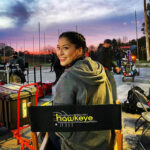 Alaqua Cox is the star of the Marvel Studios series Echo, portraying the scrappy and deadly fighter Maya Lopez. The comic book character made her television debut in 2021’s Hawkeye. Cox grew up on the Menominee Indian Reservation in northern Wisconsin and attended the Wisconsin School for the Deaf, where she played basketball and volleyball. She says she had no thoughts of fame – or even acting – in her youth. But when a casting call from Marvel sought a Deaf Native American woman in her 20s, a friend urged her to try out. She hesitated, but then got the same text from a few more friends … and decided to go for it. With more than 200,000 Instagram followers, she continues to represent the Menominee and Mohican people, as well as Deaf people and amputees.
Alaqua Cox is the star of the Marvel Studios series Echo, portraying the scrappy and deadly fighter Maya Lopez. The comic book character made her television debut in 2021’s Hawkeye. Cox grew up on the Menominee Indian Reservation in northern Wisconsin and attended the Wisconsin School for the Deaf, where she played basketball and volleyball. She says she had no thoughts of fame – or even acting – in her youth. But when a casting call from Marvel sought a Deaf Native American woman in her 20s, a friend urged her to try out. She hesitated, but then got the same text from a few more friends … and decided to go for it. With more than 200,000 Instagram followers, she continues to represent the Menominee and Mohican people, as well as Deaf people and amputees.
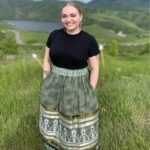 Shelby Siebers is cultural adviser and Native American support specialist at the Appleton Area School District. A member of the Oneida Nation, she recently became an art educator with the Trout Museum in Appleton where she shares her skill in Indigenous beading. Each year in her role with AASD, she has planned different events in celebration and recognition of Indigenous cultures, and advises a Native American Student Organization at each of the AASD high schools. In May 2023 she played a significant role in planning and hosting a 5K to raise awareness for Missing and Murdered Indigenous Women. She earned her degree in psychology and ethnic studies at Lawrence University in 2020.
Shelby Siebers is cultural adviser and Native American support specialist at the Appleton Area School District. A member of the Oneida Nation, she recently became an art educator with the Trout Museum in Appleton where she shares her skill in Indigenous beading. Each year in her role with AASD, she has planned different events in celebration and recognition of Indigenous cultures, and advises a Native American Student Organization at each of the AASD high schools. In May 2023 she played a significant role in planning and hosting a 5K to raise awareness for Missing and Murdered Indigenous Women. She earned her degree in psychology and ethnic studies at Lawrence University in 2020.
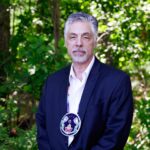 Dr. Russell Besikwebizod Swagger is president of Lac Courte Oreilles Ojibwe University. He also serves on the Wisconsin State Higher Education Aids Board, the UW-Madison Extension Board of Visitors and the American Indian Higher Education Consortium. He is an enrolled member of the St. Croix Band of Lake Superior Chippewa and was given the Ojibwe name Besikwebizod. His great grandmother’s family were enrolled members of the Lac Courte Oreilles Ojibwe Tribe. President Swagger has worked in the field of tribal higher education for 30 years with a primary focus on student services and senior administration. He also served as a CEO of a homeless shelter for a year and a half. He earned his Ph.D. from Capella University, a degree of Master in Management from University of Mary in Bismarck, N.D., a Bachelor of Science degree from Minot State University, and an Associate degree from United Tribes Technical College.
Dr. Russell Besikwebizod Swagger is president of Lac Courte Oreilles Ojibwe University. He also serves on the Wisconsin State Higher Education Aids Board, the UW-Madison Extension Board of Visitors and the American Indian Higher Education Consortium. He is an enrolled member of the St. Croix Band of Lake Superior Chippewa and was given the Ojibwe name Besikwebizod. His great grandmother’s family were enrolled members of the Lac Courte Oreilles Ojibwe Tribe. President Swagger has worked in the field of tribal higher education for 30 years with a primary focus on student services and senior administration. He also served as a CEO of a homeless shelter for a year and a half. He earned his Ph.D. from Capella University, a degree of Master in Management from University of Mary in Bismarck, N.D., a Bachelor of Science degree from Minot State University, and an Associate degree from United Tribes Technical College.
 Collin Price is owner of Heeną Development, a Milwaukee-based real estate development firm focused on multifamily and hospitality spaces, and B Team Strategy, a consulting firm that helps connect Indigenous tribes with corporate partners. He previously spent seven years as the public relations officer for the Ho-Chunk Nation and five years as a Wisconsin State Patrol officer. He is also a cofounder of the Indigenous Business Group, a nonprofit that provides opportunities for Native-owned businesses to access resources, network, and gain knowledge. He earned a degree in sociology from UW-Whitewater and a master’s degree in real estate development from Georgetown.
Collin Price is owner of Heeną Development, a Milwaukee-based real estate development firm focused on multifamily and hospitality spaces, and B Team Strategy, a consulting firm that helps connect Indigenous tribes with corporate partners. He previously spent seven years as the public relations officer for the Ho-Chunk Nation and five years as a Wisconsin State Patrol officer. He is also a cofounder of the Indigenous Business Group, a nonprofit that provides opportunities for Native-owned businesses to access resources, network, and gain knowledge. He earned a degree in sociology from UW-Whitewater and a master’s degree in real estate development from Georgetown.
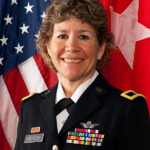 Joane K. Mathews is a retired brigadier general in the Wisconsin Army National Guard. A member of the Lac du Flambeau Band of Lake Superior Chippewa Indians, Mathews received her commission in the United States Army through the Reserve Officers’ Training Corps in 1986 and was assigned to the United States Army Avia tion School. She later flew in several missions during Operation Provide Comfort in Iraq. In 1997, Mathews transferred to the Wisconsin Army National Guard, where she was named Chief of Staff in 2013. In 2016, Mathews was promoted to brigadier general by Governor Scott Walker and was appointed Assistant Adjutant General for Readiness and Training. In 2020, Mathews was nominated for promotion to major general. Decorations Mathews has received include the Legion of Merit with oak leaf cluster, Meritorious Service Medal with two oak leaf clusters, the Army Commendation Medal with two oak leaf clusters, the Army Achievement Medal, the National Defense Service Medal and the Master Army Aviator Badge. Mathews is a graduate of Lakeland Union High School in Minocqua, Wisconsin. Other schools she attended include the University of North Dakota, the United States Army War College and the United States Army Command and General Staff College.
Joane K. Mathews is a retired brigadier general in the Wisconsin Army National Guard. A member of the Lac du Flambeau Band of Lake Superior Chippewa Indians, Mathews received her commission in the United States Army through the Reserve Officers’ Training Corps in 1986 and was assigned to the United States Army Avia tion School. She later flew in several missions during Operation Provide Comfort in Iraq. In 1997, Mathews transferred to the Wisconsin Army National Guard, where she was named Chief of Staff in 2013. In 2016, Mathews was promoted to brigadier general by Governor Scott Walker and was appointed Assistant Adjutant General for Readiness and Training. In 2020, Mathews was nominated for promotion to major general. Decorations Mathews has received include the Legion of Merit with oak leaf cluster, Meritorious Service Medal with two oak leaf clusters, the Army Commendation Medal with two oak leaf clusters, the Army Achievement Medal, the National Defense Service Medal and the Master Army Aviator Badge. Mathews is a graduate of Lakeland Union High School in Minocqua, Wisconsin. Other schools she attended include the University of North Dakota, the United States Army War College and the United States Army Command and General Staff College.
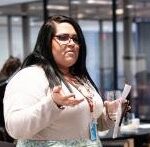 Daisee Francour is communications director for Indigenous Environmental Network, an international environmental justice nonprofit that works with tribal grassroots organizations to build the capacity of Indigenous communities. She is also an adjunct instructor in the Human Rights Advocacy Concentration at Adler University. She previously served as director of strategic partnerships and communications at Cultural Survival and has consulted for a variety of organizations on DEI, organizational development and communications strategy. A member of the Oneida Nation, she earned a bachelor’s degree from UW-Parkside and a master’s from Adler University.
Daisee Francour is communications director for Indigenous Environmental Network, an international environmental justice nonprofit that works with tribal grassroots organizations to build the capacity of Indigenous communities. She is also an adjunct instructor in the Human Rights Advocacy Concentration at Adler University. She previously served as director of strategic partnerships and communications at Cultural Survival and has consulted for a variety of organizations on DEI, organizational development and communications strategy. A member of the Oneida Nation, she earned a bachelor’s degree from UW-Parkside and a master’s from Adler University.
 Christopher Peguero is head of DEI & community engagement at Type One Energy Group. A member of the Menominee nation, he spent much of his career in Seattle, where he founded SEqual – The City of Seattle LGBTQ Employees for Racial Equity – which centered the employment experiences of queer employees of color at the City of Seattle. In 2015 he established the Seattle City Light’s Environmental Equity Program, which centers opportunities for community-led and co-designed engagement efforts to inform the electric utility’s environmental programs and policies. He later worked as a CORE (City Organizers for Racial Equity) Team member and racial equity lead before returning to Wisconsin in 2021. For two years he served as Diversity, Equity, and Inclusion Communities of Belonging Program Manager at Fitchburg biotech company Promega. He graduated from UW-Stevens Point in 1999.
Christopher Peguero is head of DEI & community engagement at Type One Energy Group. A member of the Menominee nation, he spent much of his career in Seattle, where he founded SEqual – The City of Seattle LGBTQ Employees for Racial Equity – which centered the employment experiences of queer employees of color at the City of Seattle. In 2015 he established the Seattle City Light’s Environmental Equity Program, which centers opportunities for community-led and co-designed engagement efforts to inform the electric utility’s environmental programs and policies. He later worked as a CORE (City Organizers for Racial Equity) Team member and racial equity lead before returning to Wisconsin in 2021. For two years he served as Diversity, Equity, and Inclusion Communities of Belonging Program Manager at Fitchburg biotech company Promega. He graduated from UW-Stevens Point in 1999.
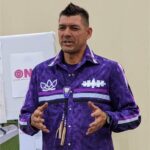 Daniel Doyen is the chief executive officer of D&T Construction, a fully Indigenous-owned construction business located on the Oneida Reservation specializing in residential, commercial and agricultural projects. He started off as a solo contractor focusing on exterior work and has grown into a business that can design, develop and build projects. The company also provides apprenticeships for young people looking to start careers in the trades.
Daniel Doyen is the chief executive officer of D&T Construction, a fully Indigenous-owned construction business located on the Oneida Reservation specializing in residential, commercial and agricultural projects. He started off as a solo contractor focusing on exterior work and has grown into a business that can design, develop and build projects. The company also provides apprenticeships for young people looking to start careers in the trades.
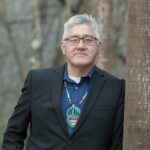 Chris Caldwell is the third president of the College of the Menominee Nation. He was formally invested in October 2021 after serving as interim president since February 2020. He began his higher education journey at CMN earning his Associate Degree in Sustainable Development. He holds a Bachelor’s Degree in Natural Resources from the University of Wisconsin-Madison and a Master’s Degree in Environmental Science and Policy from UW-Green Bay. He is currently a PhD candidate in Environment and Resources from UW-Madison Nelson Institute. He is an enrolled member of the Menominee Indian Tribe of Wisconsin.
Chris Caldwell is the third president of the College of the Menominee Nation. He was formally invested in October 2021 after serving as interim president since February 2020. He began his higher education journey at CMN earning his Associate Degree in Sustainable Development. He holds a Bachelor’s Degree in Natural Resources from the University of Wisconsin-Madison and a Master’s Degree in Environmental Science and Policy from UW-Green Bay. He is currently a PhD candidate in Environment and Resources from UW-Madison Nelson Institute. He is an enrolled member of the Menominee Indian Tribe of Wisconsin.
 Melissa Doud is tribal veteran liaison for the Wisconsin Department of Veterans Affairs, a position she took on a year ago after working more than a decade at the Lac du Flambeau Business Development Corporation. She held several roles there, including call center manager, director of corporate projects and chief operating officer. She earned an associate degree in business management from Hawaii Pacific College and a bachelor’s degree from the University of Phoenix.
Melissa Doud is tribal veteran liaison for the Wisconsin Department of Veterans Affairs, a position she took on a year ago after working more than a decade at the Lac du Flambeau Business Development Corporation. She held several roles there, including call center manager, director of corporate projects and chief operating officer. She earned an associate degree in business management from Hawaii Pacific College and a bachelor’s degree from the University of Phoenix.
This is the third of a five-part series. Part One is here and Part Two is here.
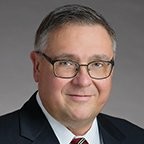 Brad McClain is chief financial officer at UW Credit Union, the third-largest credit union in the state of Wisconsin with more than 300,000 members and $4.8 billion in assets. He has served in that role for more than 21 years. He was previously CFO at Potawatomi Bingo Casino in Milwaukee. He is also a member of the board of directors of the Potawatomi Business Development Corporation. He is an enrolled member of the Standing Rock Sioux Tribe of North Dakota. He earned a degree in accounting and business finance from the UW-Platteville in 1983.
Brad McClain is chief financial officer at UW Credit Union, the third-largest credit union in the state of Wisconsin with more than 300,000 members and $4.8 billion in assets. He has served in that role for more than 21 years. He was previously CFO at Potawatomi Bingo Casino in Milwaukee. He is also a member of the board of directors of the Potawatomi Business Development Corporation. He is an enrolled member of the Standing Rock Sioux Tribe of North Dakota. He earned a degree in accounting and business finance from the UW-Platteville in 1983.
 Rob Pero is the founder, CEO, and creative director of media group Perodigm, where he produces and directs films, guides the building and execution of strategic marketing campaigns, and offers Indigenous-focused diversity, equity, and inclusion consulting for organizations nationwide. He is also founder of the Indigenous Business Group, a nonprofit supporting Indigenous-led businesses and economic development in Indian country. He is the founder of Canndigenous, the first independent Indigenous-owned hemp company in Wisconsin, and Ripley Green Apothecary, as well as the founder of a leading national cannabis advocacy organization, the Indigenous Cannabis Industry Association. He is a member of the Bad River Band of the Lake Superior Tribe of Chippewa Indians. He was also varsity girls golf coach at Cambridge High School for 10 years. He graduated from Madison College in 2001 and earned a bachelor’s degree from Full Sail University in 2013.
Rob Pero is the founder, CEO, and creative director of media group Perodigm, where he produces and directs films, guides the building and execution of strategic marketing campaigns, and offers Indigenous-focused diversity, equity, and inclusion consulting for organizations nationwide. He is also founder of the Indigenous Business Group, a nonprofit supporting Indigenous-led businesses and economic development in Indian country. He is the founder of Canndigenous, the first independent Indigenous-owned hemp company in Wisconsin, and Ripley Green Apothecary, as well as the founder of a leading national cannabis advocacy organization, the Indigenous Cannabis Industry Association. He is a member of the Bad River Band of the Lake Superior Tribe of Chippewa Indians. He was also varsity girls golf coach at Cambridge High School for 10 years. He graduated from Madison College in 2001 and earned a bachelor’s degree from Full Sail University in 2013.
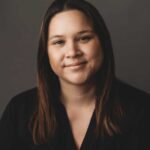 Nicole Fish is business development and improvement manager at Menominee Tribal Enterprises, where she previously served as research and development director. She spent nearly 10 years at the College of the Menominee Nation, first as financial aid and later as dean of student services. She earned a bachelor’s degree from Silver Lake College and an MBA from Lakeland University.
Nicole Fish is business development and improvement manager at Menominee Tribal Enterprises, where she previously served as research and development director. She spent nearly 10 years at the College of the Menominee Nation, first as financial aid and later as dean of student services. She earned a bachelor’s degree from Silver Lake College and an MBA from Lakeland University.
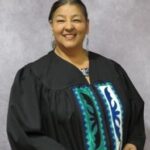 Michelle Greendeer-Rave is an associate justice of the Ho-Chunk Nation Tribal Court. She began serving as tribal attorney after graduating from the University of Wisconsin Law School in 1998. She is also a member of the Jackson County Board of Supervisors and the Western Technical College District Board of Trustees.
Michelle Greendeer-Rave is an associate justice of the Ho-Chunk Nation Tribal Court. She began serving as tribal attorney after graduating from the University of Wisconsin Law School in 1998. She is also a member of the Jackson County Board of Supervisors and the Western Technical College District Board of Trustees.
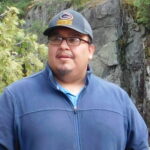 Guy Anahkwet Reiter is executive director of Menīkānaehkem Community Rebuilders, a grassroots community organization based on the Menominee Reservation in Northeast Wisconsin working to revitalize Menominee communities. Located on an 80- acre farm, the organization focuses on initiatives in food sovereignty, youth development, culture and language, energy sovereignty and environmental justice. He and other elders have hosted students from the Xicano Institute for Education and Self Determination summer program for overnight stays in the summer and taught about the land, healing medicines, and how to disconnect to reconnect to the land.
Guy Anahkwet Reiter is executive director of Menīkānaehkem Community Rebuilders, a grassroots community organization based on the Menominee Reservation in Northeast Wisconsin working to revitalize Menominee communities. Located on an 80- acre farm, the organization focuses on initiatives in food sovereignty, youth development, culture and language, energy sovereignty and environmental justice. He and other elders have hosted students from the Xicano Institute for Education and Self Determination summer program for overnight stays in the summer and taught about the land, healing medicines, and how to disconnect to reconnect to the land.
 James Flores is tribal liaison for the Milwaukee Public Museum, where he participates in exhibit design, performs outreach with community members and elected tribal government officials, and works with Tribal Historic Preservation Officers in the repatriation of cultural and ceremonial items that fall under the Native American Graves Protection and Repatriation Act (NAGPRA). He previously served as admissions counselor for Native American outreach and recruitment at UW-Madison and scholarship coordinator for the Forest County Potawatomi Foundation. Along with Micaela Salas Livingston, he pushed UW-Madison to offer free tuition to Indigenous students, a policy the university adopted earlier this year. A member of the Oneida Nation, he earned a degree in American Indian Studies with a certificate in Cultures and Communities from UW-Milwaukee in 2017.
James Flores is tribal liaison for the Milwaukee Public Museum, where he participates in exhibit design, performs outreach with community members and elected tribal government officials, and works with Tribal Historic Preservation Officers in the repatriation of cultural and ceremonial items that fall under the Native American Graves Protection and Repatriation Act (NAGPRA). He previously served as admissions counselor for Native American outreach and recruitment at UW-Madison and scholarship coordinator for the Forest County Potawatomi Foundation. Along with Micaela Salas Livingston, he pushed UW-Madison to offer free tuition to Indigenous students, a policy the university adopted earlier this year. A member of the Oneida Nation, he earned a degree in American Indian Studies with a certificate in Cultures and Communities from UW-Milwaukee in 2017.
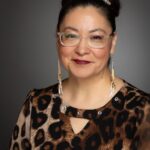 Heather Cloud Wakajapi is executive director of the American Indian Chamber of Commerce of Wisconsin, a role she took on in December. She got her start at 18 working in floor sales at Ho-Chunk Bingo, and worked her way up through a series of gaming and IT positions. She served as a tribal legislator and in 2013 became the first woman vice president of the Ho-Chunk Nation. She also served on the nation’s gaming commission.
Heather Cloud Wakajapi is executive director of the American Indian Chamber of Commerce of Wisconsin, a role she took on in December. She got her start at 18 working in floor sales at Ho-Chunk Bingo, and worked her way up through a series of gaming and IT positions. She served as a tribal legislator and in 2013 became the first woman vice president of the Ho-Chunk Nation. She also served on the nation’s gaming commission.
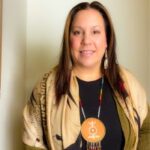 Dr. Nicole Bowman is founder and president of Bowman Performance Consulting, which provides culturally competent research, evaluation, technical assistance and other services to companies, organizations and government agencies. She is also an associate scientist and evaluator at the University of Wisconsin. In 2018, she became the first Indigenous and youngest awardee of the American Evaluation Association’s (AEA) Robert Ingle Service Award. Dr. Bowman supports a large portfolio of projects advancing radical Indigenous and community-led scholarship with Tribal and non-Tribal governments and philanthropic, non-profit, and private-sector organizations nationally and internationally. She is a member of the American Evaluation Association (AEA), a Research Affiliate for the Center for Culturally Responsive Evaluation and Assessment (CREA), an international board member of EvalIndigenous and the International Evaluation Academy, and has been in elected or appointed leadership for AEA, CREA, Indigenous Peoples in Evaluation, and EvalIndigenous. As a member of the Canadian Evaluation Society, she is coeditor and co-creator of a new permanent section for Indigenous scholarship called “Roots and Relations” in the Canadian Journal of Program Evaluation (CJPE). Dr. Bowman also recently co-edited a special global decolonization issue of the Journal of Multidisciplinary Evaluation (JMDE) with Dr. Bagele Chilisa (Bantu Tribe of Africa),a post-colonial Botswanan scholar. Dr. Bowman has been or is a reviewer and/or journal board member for CJPE, New Directions in Evaluation, American Journal of Evaluation, and JMDE. She earned her PhD in Educational Leadership and Policy Analysis from the University of Wisconsin–Madison in 2015, a Master of Education degree from Lesley University in 1997, and a Bachelor of Arts in Education from St. Norbert College in 1993.
Dr. Nicole Bowman is founder and president of Bowman Performance Consulting, which provides culturally competent research, evaluation, technical assistance and other services to companies, organizations and government agencies. She is also an associate scientist and evaluator at the University of Wisconsin. In 2018, she became the first Indigenous and youngest awardee of the American Evaluation Association’s (AEA) Robert Ingle Service Award. Dr. Bowman supports a large portfolio of projects advancing radical Indigenous and community-led scholarship with Tribal and non-Tribal governments and philanthropic, non-profit, and private-sector organizations nationally and internationally. She is a member of the American Evaluation Association (AEA), a Research Affiliate for the Center for Culturally Responsive Evaluation and Assessment (CREA), an international board member of EvalIndigenous and the International Evaluation Academy, and has been in elected or appointed leadership for AEA, CREA, Indigenous Peoples in Evaluation, and EvalIndigenous. As a member of the Canadian Evaluation Society, she is coeditor and co-creator of a new permanent section for Indigenous scholarship called “Roots and Relations” in the Canadian Journal of Program Evaluation (CJPE). Dr. Bowman also recently co-edited a special global decolonization issue of the Journal of Multidisciplinary Evaluation (JMDE) with Dr. Bagele Chilisa (Bantu Tribe of Africa),a post-colonial Botswanan scholar. Dr. Bowman has been or is a reviewer and/or journal board member for CJPE, New Directions in Evaluation, American Journal of Evaluation, and JMDE. She earned her PhD in Educational Leadership and Policy Analysis from the University of Wisconsin–Madison in 2015, a Master of Education degree from Lesley University in 1997, and a Bachelor of Arts in Education from St. Norbert College in 1993.
 Bryce Stevenson is chef and owner at Miijim, an Indigenous restaurant in LaPointe, Wisconsin, on Madeline Island in Lake Superior. Stevenson serves seasonal Ojibwe fare with a French twist, using meats like venison, bison, and rabbit alongside ingredients like wild rice, island mushrooms, and ramps. He started his culinary career working at Hello Falafel while a student at UW-Milwaukee, and went on to train at other Milwaukee restaurants like Odd Duck and Ardent. He later served as executive chef at the Indigenous Food Lab. He is a 2024 semifinalist for the prestigious James Beard Award.
Bryce Stevenson is chef and owner at Miijim, an Indigenous restaurant in LaPointe, Wisconsin, on Madeline Island in Lake Superior. Stevenson serves seasonal Ojibwe fare with a French twist, using meats like venison, bison, and rabbit alongside ingredients like wild rice, island mushrooms, and ramps. He started his culinary career working at Hello Falafel while a student at UW-Milwaukee, and went on to train at other Milwaukee restaurants like Odd Duck and Ardent. He later served as executive chef at the Indigenous Food Lab. He is a 2024 semifinalist for the prestigious James Beard Award.
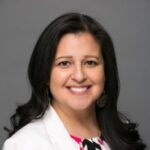 Christy Jackson is Tribal Affairs State Program Manager at the Wisconsin Depatrment of Transportation, where she implements the government-to-government relationship with tribes at the state level. She is also a primary point of contact for tribal elected officials, regional tribal liaisons, WisDOT staff, other State of Wisconsin agencies and the Great Lakes Intertribal Council. She supervises the delivery of the various WisDOT tribal programs, including the WisDOT Inter-Tribal Task Force, Tribal Labor Advisory Committee, Tribal Historic Preservation Officers Program, National Summer Transportation Institute and the Tribal Highway Construction Skills Training program. She studied business management at UW-Stout.
Christy Jackson is Tribal Affairs State Program Manager at the Wisconsin Depatrment of Transportation, where she implements the government-to-government relationship with tribes at the state level. She is also a primary point of contact for tribal elected officials, regional tribal liaisons, WisDOT staff, other State of Wisconsin agencies and the Great Lakes Intertribal Council. She supervises the delivery of the various WisDOT tribal programs, including the WisDOT Inter-Tribal Task Force, Tribal Labor Advisory Committee, Tribal Historic Preservation Officers Program, National Summer Transportation Institute and the Tribal Highway Construction Skills Training program. She studied business management at UW-Stout.
 Zoar Fulwilder is managing partner at Mavid Construction Services, a Green Bay-based firm that’s worked on projects including Lambeau Field’s suites, gates and atrium, as well as Aurora Medical Center in Sheboygan, residence halls at UW-LaCrosse and UW-Oshkosh, and many more. He is also a cofounder of the Indigenous Business Group, a nonprofit that provides opportunities for Native-owned businesses to access resources, network, and gain knowledge. He earned a degree in economics from UW-Madison in 1998.
Zoar Fulwilder is managing partner at Mavid Construction Services, a Green Bay-based firm that’s worked on projects including Lambeau Field’s suites, gates and atrium, as well as Aurora Medical Center in Sheboygan, residence halls at UW-LaCrosse and UW-Oshkosh, and many more. He is also a cofounder of the Indigenous Business Group, a nonprofit that provides opportunities for Native-owned businesses to access resources, network, and gain knowledge. He earned a degree in economics from UW-Madison in 1998.
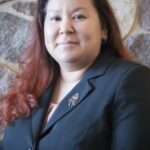 Stephanie Lozano is the Tribal Liaison for the Wisconsin Department of Children and Families, where she provides department leadership with policy analysis, tribal perspective, recommendations, and strategic advisement on tribal affairs. Prior to joining DCF in 2016, Stephanie spent 10 years working for the Ho-Chunk Nation as a social worker, Indian Child Welfare Program Supervisor and later Executive Director of Social Services. During her tenure as a social worker and supervisor she oversaw cases involving the Indian Child Welfare Act. Stephanie was an integral member of the negotiation team that codified the Wisconsin Indian Child Welfare Act in 2009 and continues to serve as a trainer and subject matter expert in the field of Indian Child Welfare. She received her Bachelors of Science in Sociology from the University of Wisconsin-La Crosse and her Masters of Social Work from the University of Wisconsin.
Stephanie Lozano is the Tribal Liaison for the Wisconsin Department of Children and Families, where she provides department leadership with policy analysis, tribal perspective, recommendations, and strategic advisement on tribal affairs. Prior to joining DCF in 2016, Stephanie spent 10 years working for the Ho-Chunk Nation as a social worker, Indian Child Welfare Program Supervisor and later Executive Director of Social Services. During her tenure as a social worker and supervisor she oversaw cases involving the Indian Child Welfare Act. Stephanie was an integral member of the negotiation team that codified the Wisconsin Indian Child Welfare Act in 2009 and continues to serve as a trainer and subject matter expert in the field of Indian Child Welfare. She received her Bachelors of Science in Sociology from the University of Wisconsin-La Crosse and her Masters of Social Work from the University of Wisconsin.
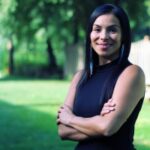 Alebra Metoxen is Indian Child Welfare Training Supervisor for the Oneida Nation, where she has served in a variety of capacities over 25 years. She’s served as a family services worker, parent program coordinator, Indian Child Welfare case manager and social worker and family services supervisor. She is also an adjunct trainer at the UW-Madison, in the Wisconsin Child Welfare Professional Development System teaching case practice with American Indian Tribes to county child welfare staff. She earned a bachelor’s degree in social work at UW-Green Bay and a master’s degree at UW-Madison.
Alebra Metoxen is Indian Child Welfare Training Supervisor for the Oneida Nation, where she has served in a variety of capacities over 25 years. She’s served as a family services worker, parent program coordinator, Indian Child Welfare case manager and social worker and family services supervisor. She is also an adjunct trainer at the UW-Madison, in the Wisconsin Child Welfare Professional Development System teaching case practice with American Indian Tribes to county child welfare staff. She earned a bachelor’s degree in social work at UW-Green Bay and a master’s degree at UW-Madison.
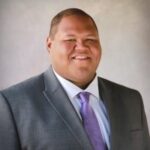 Dr. Marcus Lewis is the founder and owner of Key Change Consulting, an enrolled member of the Ho-Chunk Nation, and an African American descendant of Cameroonian and Bantu peoples. He has worked in diversity and equity for over 10 years. As a nationally trained Seeking Educational Equity and Diversity (SEED) facilitator and education leader, Dr. Lewis has dedicated his career to working in higher education administration, Native American education, and inclusive advocacy. He has presented at the national, state, and local levels about educational equity, social justice, and Native American education. He has bachelor’s and master’s degrees in music from UW-Stevens Point and the University of Nevada-Las Vegas, and a doctoral degree in education from UW-Stout.
Dr. Marcus Lewis is the founder and owner of Key Change Consulting, an enrolled member of the Ho-Chunk Nation, and an African American descendant of Cameroonian and Bantu peoples. He has worked in diversity and equity for over 10 years. As a nationally trained Seeking Educational Equity and Diversity (SEED) facilitator and education leader, Dr. Lewis has dedicated his career to working in higher education administration, Native American education, and inclusive advocacy. He has presented at the national, state, and local levels about educational equity, social justice, and Native American education. He has bachelor’s and master’s degrees in music from UW-Stevens Point and the University of Nevada-Las Vegas, and a doctoral degree in education from UW-Stout.
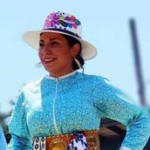 Micaela Salas Livingston is tribal liaison with Madison College, where she provides leadership, guidance, and support for Native and Indigenous initiatives, organizations, and programs both externally and internally. Originally from Bad River, she earned a partial scholarship to the UW-Madison in 2008, but had to work two jobs to afford living expenses. That experience led her, along with James Flores, to push the university to offer free tuition to Indigenous students, a policy the university adopted earlier this year.
Micaela Salas Livingston is tribal liaison with Madison College, where she provides leadership, guidance, and support for Native and Indigenous initiatives, organizations, and programs both externally and internally. Originally from Bad River, she earned a partial scholarship to the UW-Madison in 2008, but had to work two jobs to afford living expenses. That experience led her, along with James Flores, to push the university to offer free tuition to Indigenous students, a policy the university adopted earlier this year.
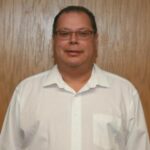 Gary Smith is Chief Judge for the Lac du Flambeau Band of Lake Superior Chippewa, and president of both the Lac du Flambeau School Board and the Lakeland Union High School Board. He is also the coordinator for the band’s Wellness Court, which assists and provides support for people with substance abuse issues. He serves on the Wisconsin Native American Judicial Committee. He is an alum of UW-Oshkosh.
Gary Smith is Chief Judge for the Lac du Flambeau Band of Lake Superior Chippewa, and president of both the Lac du Flambeau School Board and the Lakeland Union High School Board. He is also the coordinator for the band’s Wellness Court, which assists and provides support for people with substance abuse issues. He serves on the Wisconsin Native American Judicial Committee. He is an alum of UW-Oshkosh.
 Jacqueline Schram is director of public affairs and special assistant for Native American affairs at Marquette University. As co-advisor for the Native American Student Association, she aided the group in crafting Marquette’s Land and Water Acknowledgement, which recognizes the long history of Native people and nations that lived on and stewarded the land and water where the university now resides. She also staffs the Marquette Indigeneity Lab, an interdisciplinary research hub that promotes Marquette’s Indigenous undergraduate students’ research on topics that increase awareness and understanding of Indigenous history and culture in Milwaukee. She is a 2018 recipient of the university’s Excellence in Diversity and Inclusion Staff Award. She holds bachelor’s degrees from the University of Manitoba and UW-Milwaukee, and a master’s degree in anthropology from UW-Milwaukee.
Jacqueline Schram is director of public affairs and special assistant for Native American affairs at Marquette University. As co-advisor for the Native American Student Association, she aided the group in crafting Marquette’s Land and Water Acknowledgement, which recognizes the long history of Native people and nations that lived on and stewarded the land and water where the university now resides. She also staffs the Marquette Indigeneity Lab, an interdisciplinary research hub that promotes Marquette’s Indigenous undergraduate students’ research on topics that increase awareness and understanding of Indigenous history and culture in Milwaukee. She is a 2018 recipient of the university’s Excellence in Diversity and Inclusion Staff Award. She holds bachelor’s degrees from the University of Manitoba and UW-Milwaukee, and a master’s degree in anthropology from UW-Milwaukee.
 Dr. Rachel Byington is tribal liaison for the Wisconsin Historical Society. She previously served as tribal youth and community liaison at Earth Partnership within the UW-Madison, where she started as an intern in 2014. Rachel is an enrolled citizen of the Choctaw Nation of Oklahoma. She holds a BS in Family, Consumer, and Community Education, and an American Indian Studies certificate, and a MS in Civil Society and Community Studies, all from the UW-Madison. She received her PhD in Civil Society and Community Studies in UW-Madison’s School of Human Ecology.
Dr. Rachel Byington is tribal liaison for the Wisconsin Historical Society. She previously served as tribal youth and community liaison at Earth Partnership within the UW-Madison, where she started as an intern in 2014. Rachel is an enrolled citizen of the Choctaw Nation of Oklahoma. She holds a BS in Family, Consumer, and Community Education, and an American Indian Studies certificate, and a MS in Civil Society and Community Studies, all from the UW-Madison. She received her PhD in Civil Society and Community Studies in UW-Madison’s School of Human Ecology.
Who’d we miss? Let us know who should be on next year’s list by emailing [email protected]!

























